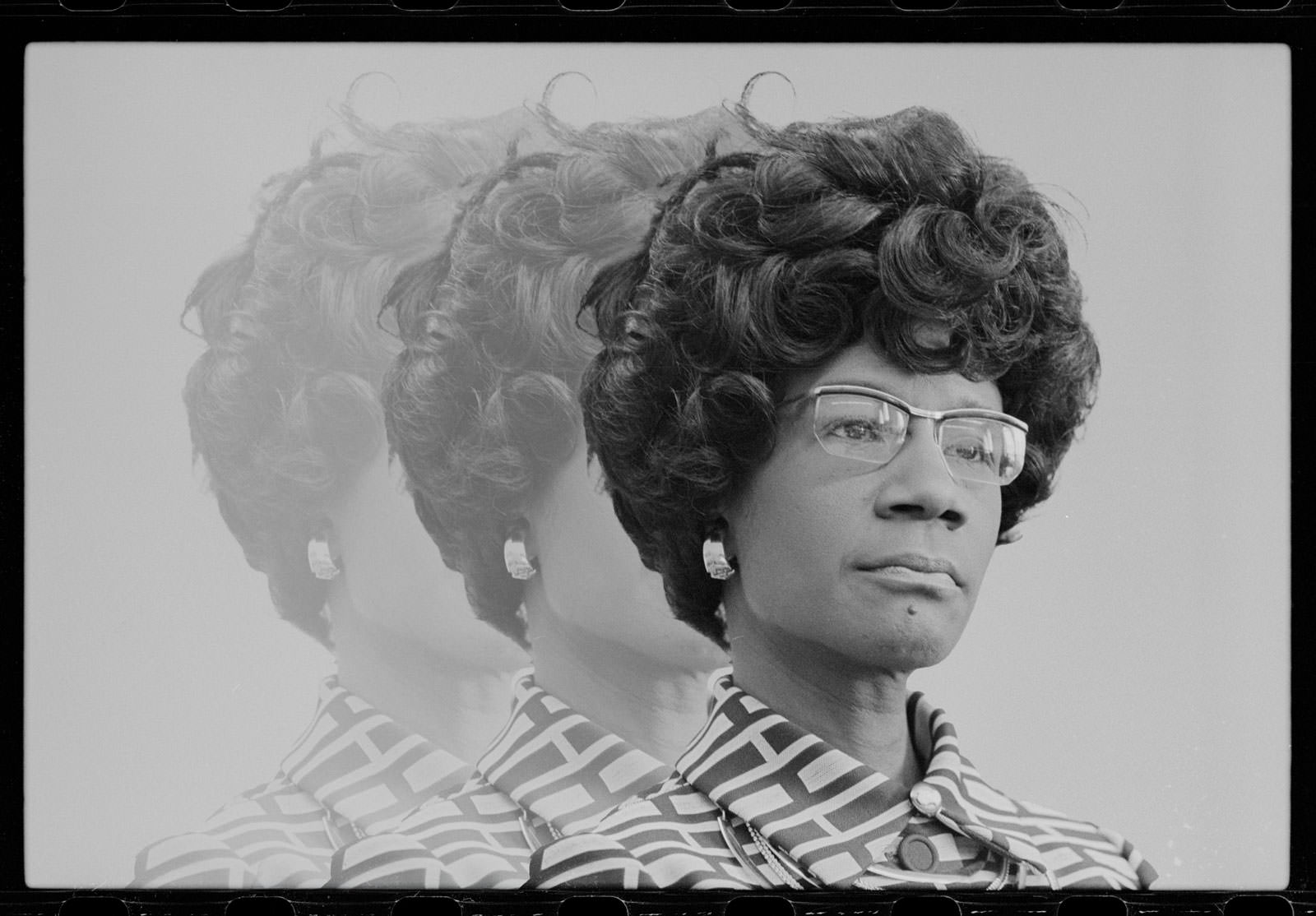Shirley Chisholm was the first Black woman to serve in Congress (elected in 1968) and the first Black woman to run for President (1972). The writer Clara Bingham’s absorbing and poignant oral history, The Movement: How Women’s Liberation Transformed America 1963-1973, depicts the impediments faced by the pioneering politician from Brooklyn—barriers which today more than fifty years later are again being tested by Vice President Kamala Harris – ed.
Born in Brooklyn to Barbadian parents in 1924, Shirley Chisholm showed an early interest in political activism when she attended Brooklyn College, graduating in 1946. She earned her master’s degree at Columbia Teachers College in 1951 and began her teaching career. But she also got involved in politics, by joining the Urban League and the National Association for the Advancement of Colored People (NAACP). In 1964, she would defy hundreds of years of convention and run for the New York State Assembly.
SHIRLEY CHISHOLM
By 1964, there was a vacancy in the State Assembly. I wanted it, and I told the club I felt I deserved it. This was unwelcome news. Some of the men fancied the nomination themselves. By then I had spent about ten years in ward politics and had done everything else but run for office. Starting as a cigar box decorator, I had compiled voter lists, carried petitions, rung doorbells, manned the telephone, stuffed envelopes, and helped voters get to the polls. I had done it all to help other people get elected. The other people who got elected were men, of course, because that was the way it was in politics. This had to change someday, and I was resolved that it was going to start changing right then. I was the best-qualified nominee, and I was not going to be denied because of my sex. . . .
I [was] met with hostility because of my sex from the start of my first campaign. Even some women would greet me, “You ought to be home, not out here.” . . . I handled all such hecklers, male and female, the same way. I told them calmly that I had been serving the community for a number of years and now I would appreciate an opportunity to serve it on a higher level, in elected office.
In a three-way contest, Shirley Chisholm won decisively. Women voters turned out in droves for Chisholm, who became the first Black woman elected to public office in Brooklyn. She joined one other Black woman, Bessie Buchanan from Harlem, in Albany where she served in the General Assembly for four years. In 1968, when redistricting created the first majority-Black district in Brooklyn, Chisholm made the bold decision to run for the US Congress, a place where no Black woman had ever served.
SHIRLEY CHISHOLM
Starting in February 1968, I spent ten months doing the only thing I could do: I tramped the streets of Williamsburg, Crown Heights, and Bedford-Stuyvesant, telling my story to the people. I didn’t have the money for a conventional congressional campaign; I had to make up for it with hard work. I almost killed myself because I wanted to show the machine that a little Black woman was going to beat it. I wrote a slogan that said it all: “Fighting Shirley Chisholm—Unbought and Unbossed.”
CONRAD CHISHOLM
She ran a door-to-door campaign. She got into housing projects. It was one of those campaigns run on a shoestring. Because there were no big donors, nobody wanted her. She’s a woman and she’s Black? No, no. Big Democratic clubs would give money to the other people.
BARBARA WINSLOW
Her primary opponent, State Senator William C. Thompson, disregarded her so much that he went away on vacation.
SHIRLEY CHISHOLM
When they counted the primary votes, with a very small turn out, I won by about a thousand votes. By this time my Republican opponent was in the field: James Farmer, the former national chairman of CORE, the Congress of Racial Equality. The New York Republicans had seen a golden opportunity in the new Black Brooklyn district, and figured he was just the man to cash in on it for them. Of course, he didn’t live in Brooklyn, and never had.
BARBARA WINSLOW
James Farmer was tall and handsome and a great speaker. He also had all the celebrity endorsements—Harry Belafonte, Ossie Davis, Ruby Dee. But Chisholm had the support of the women, and Farmer ran a totally masculinist campaign. Remember, it’s ’68, three years after the Moynihan Report attacks the Black matriarchy, and he played on this. He said we’ve got to send a man to Congress. Chisholm went to the women and said you have a chance to do something historic, electing the first Black woman to Congress.
(Daniel Patrick Moynihan’s 1965 report, The Negro Family: The Case for National Action, placed some of the blame for Black economic and social inequality on the strong matriarchal structure found in many Black families. Moynihan, LBJ’s assistant secretary of labor [and later a four-term US senator from New York], intended to demonstrate to the president that the landmark civil rights legislation of 1964 and 1965 could not bring true equality to Black Americans unless coupled with economic advancement and opportunity. But Moynihan’s many critics accused him of blaming the victim and vilifying Black women for being better educated and employed in higher-level jobs than Black men. Lines like these from the report have gone down in infamy: “In essence, the Negro community has been forced into a matriarchal structure which, because it is so out of line with the rest of the American society, seriously retards the progress of the group as a whole, and imposes a crushing burden on the Negro male and, in consequence, on a great many Negro women as well. Ours is a society which presumes male leadership in private and public affairs. The arrangements of society facilitate such leadership and reward it. A subculture, such as that of the Negro American, in which this is not the pattern, is placed at a distinct disadvantage.”)
SHIRLEY CHISHOLM
Farmer’s campaign was well oiled; it had money dripping all over it. He toured the district with sound trucks manned by young dudes with Afros. Beating tom-toms: the big, Black male image. He drew the television cameramen like flies, a big national figure, winding up to become New York City’s second Black congressman (after Adam Clayton Powell of Harlem). His people were flooding the streets. The television stations ignored the little female who was running against him. One station I called to complain to, came right out and told me, “Who are you?” the man asked. “A little schoolteacher who happened to go to the State Assembly?”
New York Times, April 13, 1969,
“This Is Fighting Shirley Chisholm,”
by Susan Brownmiller
Bongo drums on the streets—a regular part of Farmer’s campaign in Bedford-Stuyvesant—projected an image redolent of Africa and manhood. Farmer’s handbills stressed the need for “a man’s voice” in Washington. This may have been what the Moynihan Report was talking about, but it didn’t sit well with Shirley Chisholm.
The black male mystique stung Shirley Chisholm (she recalls walking into public meetings and being greeted by the catcall, “Here comes the black matriarch!”) but the unspoken truth of the Farmer campaign was that Farmer’s “black male” image had a double edge. The women of Bedford-Stuyvesant knew without being reminded that James Farmer had a white wife.
BARBARA WINSLOW
Something like 60 to 75 percent of the registered voters in the district were women. Shirley was in every community, religious, school, political immigrant group. She knew she had a fighting chance, because she could mobilize the women.
New York Times, April 13, 1969,
“This Is Fighting Shirley Chisholm,”
by Susan Brownmiller
Her early heroes were Mary McLeod Bethune, Harriet Tubman, and Susan. B. Anthony. Miss Anthony, the homeliest of the suffragettes, was one of the movement’s best speakers. In her Brooklyn campaign, Mrs. Chisholm would reel off a long quotation from Susan B. Anthony when she was bothered by male hecklers on street corners:
“The day will come when man will recognize women as his peer, not only at the fireside but in the councils of the nation. Then, and not until then, will there be the perfect comradeship, the ideal union between the sexes that shall result in the highest development of the race. ”
“It always stopped them cold,” she reports.
SHIRLEY CHISHOLM
So I went and contacted all the women’s organizations that I could get in contact with, white women’s organizations, Black women’s, Hispanic women’s, and I ran on that basis because James Farmer was constantly going against me with this machismo. . . . He said you need someone tough. . . . Shirley Chisholm’s smart. She’s bright. She’s articulate, . . . but she’s a frail little woman. That gave me more spunk to show him.
CONRAD CHISHOLM
Another thing that was interesting about her campaign was that 25 percent of her district was Spanish-speaking. She spoke Spanish very well, and the Spanish-speaking people said, you know, Shirley took time out to study our language to represent us. She got all the Spanish votes.
SHIRLEY CHISHOLM
I beat him in the November election 2.5 to 1. I drew 34,885 votes to his 13,777.
Sworn in on January 3, 1969, Shirley Chisholm stepped into the precedent-setting role as the first Black female member of Congress with fierce determination and her signature charm. A national media sensation, Chisholm was inundated with requests for interviews, while many of her white male colleagues treated her like a pariah.
McCall’s, August 1970,
“A woman who knows all about race prejudice tells why sex prejudice is even more frustrating—and harder to fight,”
by Shirley Chisholm
Being the first black woman elected to Congress has made me some kind of a phenomenon. There are nine other blacks in Congress; there are ten other women. I was the first to overcome both handicaps at once. Of the two handicaps, being black is much less of a drawback than being female.
BARBARA WINSLOW
She went to Congress. In some ways, for younger people to understand it, it was very much like AOC’s (Alexandria Ocasio-Cortez) election. Chisholm was very daring, she was fierce, she was by then a feminist, she was the honorary chair of the National Abortion Rights Action League (NARAL), she introduced the Equal Rights Amendment in Albany and when she got to Washington. She spoke out against the argument (made by some Black Power activists) that abortion was genocide.
SHIRLEY CHISHOLM
When I got there, I was very, very unhappy. Never before had a Black woman sat in the United States Congress. I felt like I was somebody coming out of the moon. They wouldn’t sit with me in the (members-only) restaurant when I would eat you were supposed to go to your delegation’s table, but I didn’t know where the New York delegation sat. So I sat at an empty table and I ordered my lunch. I was very hungry that day, and the table was crowded with everything that I had to eat. I didn’t know it because the tables weren’t marked, but I had sat at the Georgian delegation table. The men would come in, and nobody would sit with me. I took out my New York Times and read it. They just could not sit at a table, in the House of Representatives, where a Black woman was seated.
SHIRLEY DOWNS
She is just extraordinarily comfortable with a very wide range of people. She exudes this warmth. She always made a point of working with Republicans across the aisle, of working with conservative Democrats. She’s a very polite person, and she’s very interested in other people’s views, even if she doesn’t necessarily agree, she will always listen. I think they were surprised because she’s so polite.
SHIRLEY CHISHOLM
I had (American) Indians on the staff, I had Blacks on the staff. I had an Italian woman on the staff. I had Puerto Ricans on the staff. I had everything. The real League of Nations staff. And that’s what I really wanted so that people can see each other and learn to appreciate each other.
SHIRLEY DOWNS
She’s a lady. Mrs. Chisholm is one of these people whose shoes and bags always match, and she’s got manners. She would sit in the members lunch room and talk to people and be very forthcoming.
SHIRLEY CHISHOLM
My staff loved the way I dressed. They said, “But Chizzy, you’re always so dressed up.” I said, “I was raised that way.” You see, I tried to bring my life into the clothes so that you could understand me as a person. That was the way that I was reared. My mother, my grandmother always said you must be well attired. You have to have your shoes shined and things like that. But Shirley Downs was the one I had to talk to constantly because she was a product of the sixties. But she was a very smart woman. When we were going places, I had to tell her, “You have to be fashionable today. Two stockings of the same color.”
BARBARA WINSLOW
The famous story is that she was put on the Agricultural Committee and she didn’t want to do it.
SHIRLEY CHISHOLM
The first big event in a freshman congressman’s career is his assignment to a committee. He is not likely to get the one he wants because length of service, seniority, counts more than anything else. But for the sake of courtesy the leaders of his party ask him which one he prefers. My first choice, naturally, was the Education and Labor Committee. There were some vacancies on the Democratic side, and it would have made sense to take advantage of my twenty years’ experience in education by appointing me to one of them. I found out that they had assigned me the Agriculture Committee and my subcommittee assignments were to be rural development and forestry. Forestry!
New York Times, April 13, 1969,
“This Is Fighting Shirley Chisholm,”
by Susan Brownmiller
Representative Chisholm began her fight to change her assignment from a House Agriculture subcommittee on Forestry and Rural Villages to something more relevant to her Bedford-Stuyvesant community. She approached Speaker John McCormack, who told her, she reports, to accept the assignment and “be a good soldier.” She brooded about that for a while, she says, and then decided, “That’s why the country is the way it is.” Mrs. Chisholm then placed an amendment before the House Democratic caucus to remove her name from the Agriculture Committee, aware that she was taking an unprecedented step—bucking the powerful Wilbur Mills of Arkansas, chairman of the House Ways and Means Committee.
SHIRLEY CHISHOLM
I walked right down on the floor of the House and stood before the members. I realized that I did this without being acknowledged, and I told them that it seems to me that all you know is that no tree grows in Brooklyn. And I don’t know one wood from another. I want an assignment that has to do with the people of my district. “You have to take what is given to you.” I said no, I’m not going to take it. The next two or three days they gave me Veteran Affairs, and I told them, well that’s a smart move. There are far more veterans in the district than trees.
Several of the male members spoke to me afterward in sympathetic terms, as if I had just had a death in the family. “You’ve committed political suicide,” one advised me. That phrase sort of made me feel at home.
It is incomprehensible to me, the fear that can affect men in political offices. It is shocking the way they submit to forces they know are wrong and fail to stand up for what they believe. Can their jobs be so important to them, their prestige, their power, their privileges so important that they will cooperate in the degradation of our society just to hang on to those jobs?
A Congressman from South Carolina used to say to me all the time, “Shirley, you ought to kiss the floor when you come into this Congress. You know why you ought to kiss the floor? Because you getting forty-two-five like me.” I said, “What are you saying? You’re making forty-two-five like me?” This is all he kept saying, “Forty-two-five.”
BARBARA WINSLOW
Members of Congress made $42,500,his point was, how dare you make as much money as me. There was another Southern legislator, who Chisholm’s staffer said every time she would stand up to leave a committee meeting, the congressman would clean off her seat.
SHIRLEY CHISHOLM
One day Brock Adams, he was the white congressman from Washington, said, “Every time you come into this chamber, that man from Arkansas starts coughing.” So I said maybe he should go to a doctor. Brock Adams said, “He coughs every time you come through (the floor of the House chamber) and then when you get near to him, he puts his handkerchief up and spits in it.” I said, “Are you sure?” He said, “We know that.”
Brock Adams asked, “When is Shirley Chisholm going to take care of that gentleman?” I had on a beautiful sweater suit, and I went out and purchased a male handkerchief. I put the handkerchief in the pocket of my suit. And sure enough, as I was walking down the aisle, he started coughing, coughing. I had synchronized when to pull out my handkerchief. Just as I got near him, he started coughing and he spat in the handkerchief. I pulled out my handkerchief right there, and spat in the handkerchief in front of his face and said, “Good day.” He hasn’t done it since.
By the end of March . . . President Nixon announced on the same day that he had decided to build an ABM (antiballistic missile) system, and that the Head Start program in the District of Columbia was to be cut back for lack of money; that was enough for me. I started working on my maiden speech in the House. I had to tell the world that it was wrong to plan to spend billions on an elaborate and unnecessary weapons system when disadvantaged children were getting nothing.
BARBARA WINSLOW
She decided to devote her maiden speech in Congress to explaining why she planned to vote against every defense funding bill until Congress began to vote for programs providing jobs and social welfare. Referring to herself as a teacher and a woman, she said, “As I take this stand today I am joined by every mother, wife, and widow in this land who ever asked herself why the generals can play with billions while families crumble under the weight of hunger, sickness, and unemployment.” She concluded, “We must force this administration to rethink its distorted, unreal state of priorities. Our children, our jobless men, our deprived, rejected and starving fellow citizens must come first. For this reason I intend to vote ‘no’ on every money bill that comes to the floor of this House until our country starts to use its strength, its tremendous resources for people and peace, not for the profits of war.”
Clara Bingham is a journalist, author and documentary film producer.
These excerpts on the life of Shirley Chisholm are adapted from THE MOVEMENT: How Women’s Liberation Transformed America 1963-1973 by Clara Bingham. Reprinted by permission of One Signal Publishers/Atria Books, a Division of Simon & Schuster, Inc.






